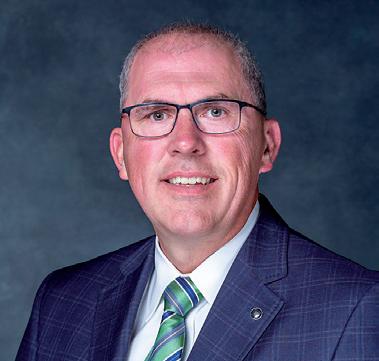
2 minute read
COOPERATIVE PROGRAM HELPS ENSURE WE DO MORE TOGETHER

The Cooperative Program is both the legacy and the future of Southern Baptist missions
Advertisement
BY BART BARBER PRESIDENT,
The Southern Baptist Convention can exist without the Cooperative Program. Heresy? No. It’s a historical fact. The Southern Baptist Convention was formed in 1845. The Cooperative Program was launched in 1925. For 80 years, the Southern Baptist Convention existed without the Cooperative Program.
The Southern Baptist Convention can exist without the Cooperative Program, but why would we want to do so? Everyone who was alive in the preCooperative-Program SBC is long dead, leaving no one to remind us of what it looks like to cooperate as Southern Baptists without the Cooperative Program—no one, that is, besides dry, boring historians like me.
Before the CP, a much lower percentage of our gifts actually made it to the work we were trying to support. Sometimes I encounter Southern Baptists who are newly aware that a small fraction of our gifts goes to support insurance policies, legal services, and other overhead. But before the CP, every entity funded an army of fundraisers to go from church to church asking for money.
William Clark canvassed Arkansas Baptist churches in the years before the CP to raise money for the Home Mission Board, but he was permitted to keep in his own pocket the first several thousand dollars that he raised each year as his salary. Each board and seminary had to employ an army of “agents” like this at great expense, and each church was beset with agent after agent, all begging for a Sunday to appear before the congregation and raise money. Because of the Cooperative Program, a much higher percentage of your gifts gets to the front lines to do the work.
Before the CP, competitive pressures made it more difficult for entities in the SBC family to work together. The various entities were making direct appeals to churches for funding, so they had to highlight ways that their work was “more worthy” of church support than the other entities.
Because of the Cooperative Program, seminaries have been able to develop innovative training programs to get missionaries on the field faster, the SBC Executive Committee is able to partner with state conventions to collect ACP data, and local associations can equip associational disaster relief units to serve in state convention disaster relief ministries with funds provided by national Send Relief. The Cooperative Program really does promote cooperation.
There are only three options available to Baptists outside of the Cooperative Program, and they have all been around since at least the 1800s. The anti-missions route focuses all of the energies and funding of the local church upon that particular local church. It achieves peak doctrinal and methodological uniformity (since only one church is involved!), but it does so by ignoring the need to share the Gospel around the world. The societal approach of the old Northern Baptists or the convention approach without a unified budget achieves all of the good intentions of the Cooperative Program, but with massive loss to the inefficiencies of fundraising and duplication. The Independent Baptist approach makes each missionary an entrepreneur, forcing them to divide their time between missions on the field and fundraising back home. It often punishes with starvation rations the missionary powerfully gifted at reaching Japanese people with the Gospel while enriching the missionary who connects more naturally with wealthy Americans than with Buddhists living somewhere in a yurt.
The greatest periods of growth, stability, and efficiency for SBC state conventions and national entities have taken place since the creation of the Cooperative Program. The birth of the Cooperative Program also coincided with the healthiest and most evangelistically productive epoch for local SBC churches. That is not an accident. Nothing human beings manage is perfect, but we all will make wiser decisions when we realize that a Southern Baptist Convention without the Cooperative Program, while possible, is nothing to hope for.
Gospel
2022

$6,103,854
$2,062,828






